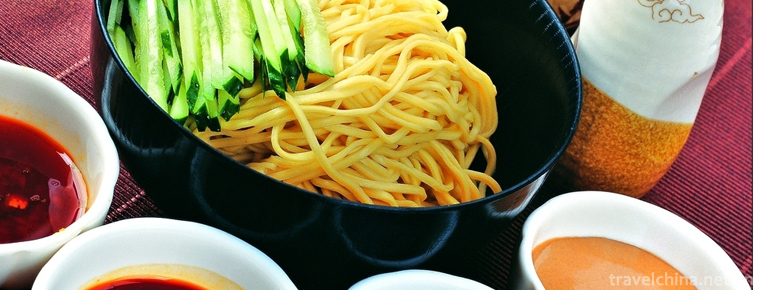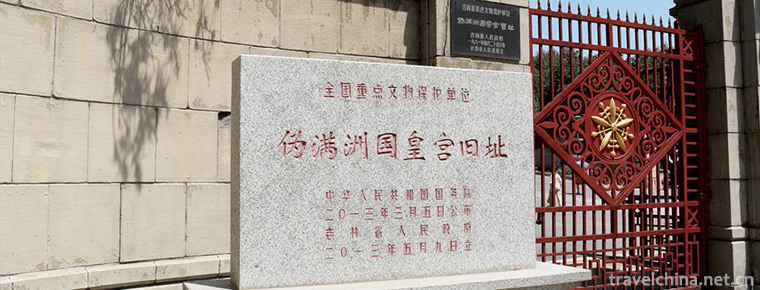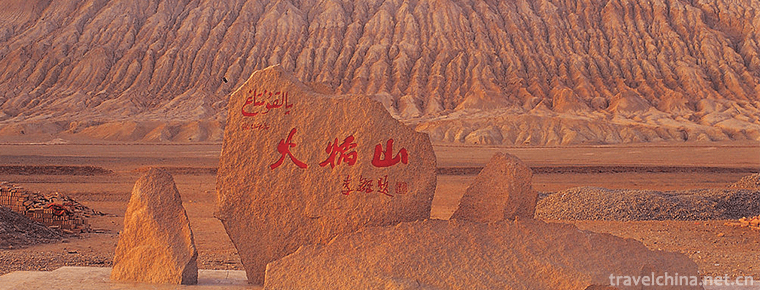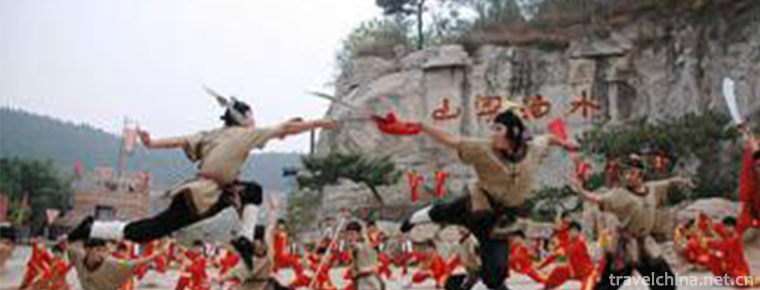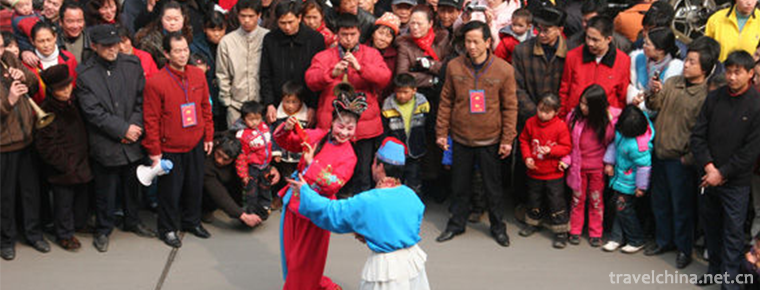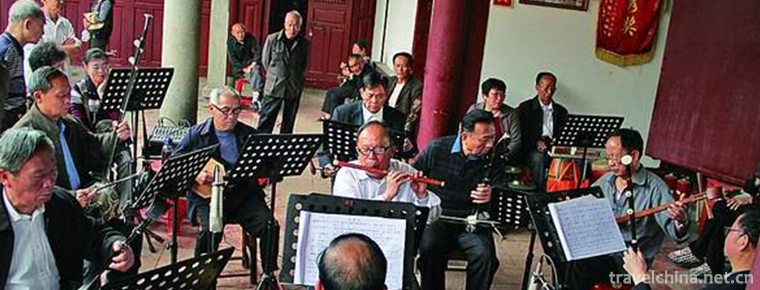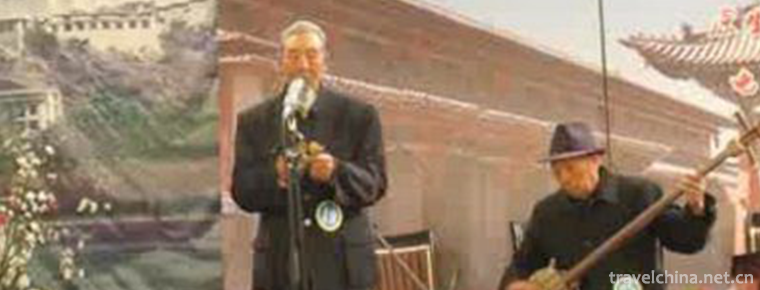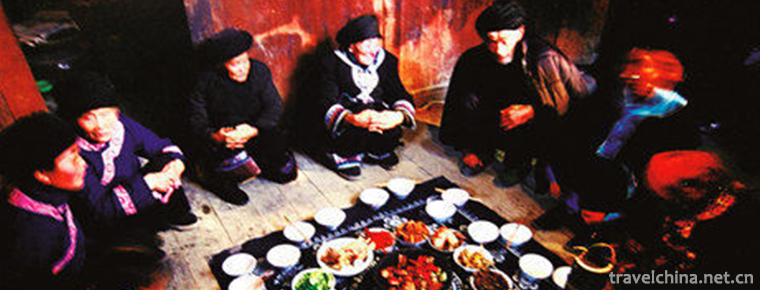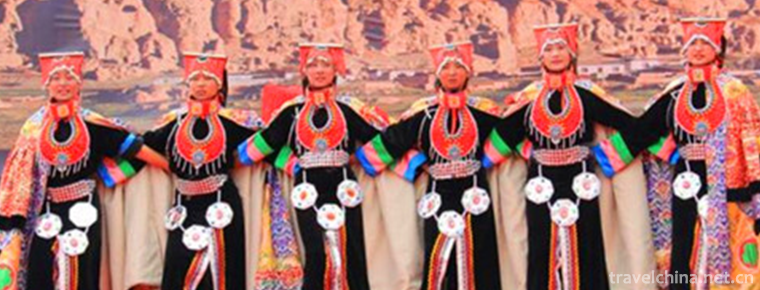Sichuan Book Review
Sichuan Book Review
Sichuan commentary, also known as vernacular speech and commentary, is one of the traditional operas in Sichuan Province. It is popular in all parts of Sichuan and Yunnan and Guizhou. The performers tell stories in Sichuan dialect with one table, one folding fan and one waking wood. Shooting a reminder wood before the speech can remind the audience and set off the atmosphere. Folding fans are used as analogous objects.
On May 23, 2011, Sichuan appraisal was approved by the State Council to be included in the third batch of national intangible cultural heritage list.
Historical Origin
Sichuan commentary originated from the Tang Dynasty's "talk" and Ming Dynasty's "comment" and flourished in the Qing Dynasty. After Xianfeng, Sichuan's book-reviewing flourished for a time. Zhong Xiaofan and Dai Quan were famous artists of book-reviewing.
According to "Chengdu Tongjian" records: the earliest Sichuan Book Review was to set up a shed in the city, and put a lantern in the form of "Book Review" on the stage. The storyteller raised the folding fan and stepped back, telling the story of the confrontation between generals and generals, the confrontation between the two armies, the shouting and fighting, and the short fight and arrest, giving people the feeling of a bone-and-bone explosion.
Sichuan has a long history of book reviewing, with a large number of talented people, and is known for its local language characteristics. Because of the difference of the way of writing and the way of expression, there are "clear shed" and "thunder shed". The Qingpeng mainly talks about smoke powder, legends and other amorous stories, emphasizing on literary discourse, paying attention to elegant conversation and moving feelings. "Qingpeng" is a basic skill for literati to engage in storytelling, with no formula and emphasis on literary grace, stressing "voice, talent, debate and broad knowledge", emphasizing "cadence, fluency of speech", "inversion, quick thinking", "painting voice and color, speeches and swords", "wide-ranging, trustworthy and handy".
Lei Peng mainly talks about history and Golden Golden Horse bibliography, focusing on the martial arts, pay attention to imitative description. The golden drum cannon and the whistling of horses and tigers are expressed by the artist's mouth, so that the audience can hear their voices. Leipeng artists also have martial arts books specializing in such things as Park's knife, rod and stick. In addition, there is a school that combines "Qing" and "Lei" in one furnace, which has both civil and military skills. It has a wide range of books and compiles some bibliographies of modern and modern life. After the founding of the People's Republic of China, Sichuan Book Review also developed a form of rhyme book review, narrating stories in rhyme, reciting intonation in performance, catchy. The short bibliographies reflecting modern life, such as "Cold Gun War", "Battle in Heaven" and "Heroes on Mount Mira", etc.
In the 1950s, Sichuan calligraphy artists created a short and succinct "rhyme review book" to tell stories in rhyme. In the 1960s, critics and professional writers adapted a number of revolutionary novels, such as "Red Rock", "Defending Yan'an", "Fire King Kong", "Lin Haixueyuan" and "Plain Gun Sound", into commentary stories and successfully quoted them. Li Boqing, a representative figure of modern Sichuan's book reviews and a master of folk music and art, has created a new form of storytelling on the basis of traditional book reviews, namely "Sanda book reviews" quotation. The famous actors of Sichuan Book Review include Wang Bingcheng, Zhong Xiaofan, Fu Pingchuan, Tang Yulong and so on. Xu Xun, a famous commentator, won the audience's praise for his excellent performance art of "strong hands, eyes, body and steps".
Sanda Review
Since the Tang and Song Dynasties, book reviews have gradually flourished and become one of the most important ways of entertainment and leisure for Chinese people after tea and dinner. In the 1980s, book reviews made another brilliant achievement. "Everywhere there are wells, listen to Dantianfang." At that time, book reviews were just like today's popular songs. However, in the 1990s, with the increasing abundance of popular entertainment, fewer and fewer people listened to book reviews, and the art of book reviews began to decline.
However, in Sichuan, the pace of commentary leaving the people seems to be slowing down. The reason is that in the late 1990s, the reform of commentary took place in Chengdu. The originality of Li Boqing's Sanda commentary spread all over Chengdu streets and alleys. The emergence of Li Boqing made the commentary of Sichuan revitalized, making the commentary of Sichuan "go up against the current" in the declining tide of commentary. For a time, the phenomenon of "Li Boqing" became the media. Topics studied by experts.
Compared with traditional reviews, the greatest contribution of Li Boqing's Sanda reviews lies in the innovation of the content of the reviews, which is closer to the times. Many passages are directly derived from real life. This innovation, which is close to reality, life and the people, has also made new development of Sichuan's reviews.
Speaking of Sichuan Book Review, maybe everyone will have a tall, thin body, prominent cheekbones, small orbital triangle eyes, a small beard, a bright forehead man, he is Li Boqing, a person who pushes Sichuan Book Review to the end of the street through innovation. Many Chengdu people say that only Li Boqing can represent the "vulgar" culture of contemporary Chengdu. Chengdu people like this thin, tall man who is in high spirits when he talks. Since 1994, when Li Boqing began to talk about Sanda Reviews, people still like to hear him say Sanda Reviews for more than ten years.
Li Boqing inaugurated the era of "Sanda Criticism"
Li Boqing's Sanda is "keeping pace with the times" and the WTO is a hot spot. He Sanda WTO and Sanda SARS during SARS. In the Spring Festival of 2005, Li Boqing also launched the "Twelve Zodiacs of Sanda" on Sichuan TV. In the program, he no longer played alone, but also the Sichuan version of the "Twelve Woman Music Square" - the folk music group "Jincheng Silk Tube and Shuyue for Women", which played the tailor-made "Twelve Zodiac Songs" for the program, and the beautiful women came on stage to dance with Li Boqing. People who often listen to Li Boqing's storytelling and commenting find that the forms of Li Boqing's storytelling are becoming more and more diverse.
Li Boqing loves to receive his apprentices. Several of his apprentices are hosts of prime-time TV stations in Sichuan, such as Liao Jian, Dingdang and Min Tianhao. Liao Jian is an apprentice who used Li Boqing's Sanda storytelling to live and learn. He founded the "trump rap" form on the basis of Sanda storytelling. Liao Jian, dressed in hip-hop on the stage, has a mouth, and the popular rhythm of RAP is: "Don't make noise with your baby, don't make noise with your baby, and I'll blow your baby up with a hard fight on the table." Liao Jian inherited and developed Li Boqing's classic "Sufen" and "Ha Su Dun", and composed them into songs: "That day you eat cold powder on Chunxi Road, I chew hoof flowers beside you... We two beat haha'er and take you around the South River. At one time, "Sufen" became the most popular folk song in Sichuan.
Liao Jian also had a brother named Lu Pin, who was the creator of "Dialect Animation" popular in Chengdu in 2004. In February 2004, Lu Pin planned the Sichuan dialect version of Cat and Mouse: Tom Kitty's name is "fake sophisticated", and Jerry Mouse's name is "windmill". "Fake sophisticated" and "windmill" have become a pair of tit-for-tat friends in the dialect version. Cat and Mouse sold 200,000 sets in Sichuan as soon as it went on sale. It also directly set off a domestic trend: Northeast dialect version, Henan dialect version, Lanzhou dialect version...
Content Innovation
Unfortunately, such a good day did not last long. Li Boqing chose to leave Chengdu for Chongqing when his Sanda Review was in full swing. Sanda reviews show a downturn. Some people attribute the reasons to Li Boqing's departure and lack of heirlooms. However, this is not the key to the problem. Even though Li Boqing has returned to Chengdu, he has also trained several proud students, but now Sanda reviews are not the same as before, and it seems that Sichuan reviews can not escape the fate of traditional reviews. Today, in addition to Li Boqing's continuing adherence to Sanda, another master, Luo Shizhong, has been sticking to the traditional local commentary.
Content innovation once revitalized Sichuan's book reviews, but content innovation alone could not make Sichuan's book reviews achieve sustainable development. To give vitality to the evaluation, content innovation is only on the one hand, on the other hand, it is still in the use of modern communication methods and marketing means. Relevant experts said that in order to form a healthy industrial chain for the development of cultural industry, the most important thing is the modern marketing concept and talents. The prerequisite for the development of traditional culture is to support the excellent content as the first step, but the content alone can not maintain the sustainable development of cultural industry, as seen from the National situation.
Performing Features
Sichuan Book Review is based on Sichuan dialect. The epidemic areas are all over Sichuan urban and rural areas. Because of the similar pronunciation, they also spread to Yunnan and Guizhou provinces. Sichuan has a long history of book reviewing, with a large number of talented people, and is known for its local language characteristics. Because of the difference of the way of writing and the way of expression, there are "clear shed" and "thunder shed". The Qingpeng mainly talks about smoke powder, legends and other amorous stories, emphasizing on literary discourse, paying attention to elegant conversation and moving feelings. Lei Peng mainly talks about history and Golden Golden Horse bibliography, focusing on the martial arts, pay attention to imitative description. The golden drum cannon and the whistling of horses and tigers are expressed by the artist's mouth, so that the audience can hear their voices. Leipeng artists also have martial arts books specializing in such things as Park's knife, rod and stick. In addition, there is a school that combines "Qing" and "Lei" in one furnace, which has both civil and military skills. It has a wide range of books and compiles some bibliographies of modern and modern life. Since the founding of the People's Republic of China, Sichuan's book reviews have also developed a form of rhyme reviews, in which stories are narrated in rhyme and recited intonations are used in performances.
Li Boqing's "Sanda Criticism", which is not rigid in form and rich in content, uses the way of setting up a dragon gate array, bragging and other ways to talk about things in an informal way, and uses his keen observation of social dynamics and vivid analysis with critical spirit to make humor popular and popular in Southwest China, which is very close to the life of citizens.
Bibliographic Introduction
The traditional bibliographies of Sichuan's book reviews are extremely rich after the accumulation and artistic processing of artists in past dynasties. They are divided into "ink book" and "article book". Mohist books are bibliographies adapted and performed according to romances and novels, including Three Kingdoms, Water Margin, Sui and Tang Dynasties, Bao Gong Case, Ji Gong Zhuan, Liaozhai, Shuo Yue Zhuan, Wen Wu Bang, etc. Articles are bibliographies created by artists, including "Wang Sanhuai opposes Dazhou", "Jinji Furong Tu", "Tie Xia Ji" and so on. There is also a "Chongqing Ancient Stories" set against the background of the War of Resistance Against Japan. After the founding of the People's Republic of China, many new bibliographies adapted from modern fiction were performed in Sichuan, including Lin Haixueyuan, Plain Gun Sound, Red Rock and Wang Ruofei in Prison.
Modern Famous Scholars
old gentleman
Mr. Xu Xun is the first surviving commentator in Sichuan. He is the winner of the Peony Award for Lifelong Achievement of Chinese Quyi. He enjoys the special allowance of the State Council. He is the only master in Sichuan commentatory who has won so many honors for his achievements.
Mr. Luo Shizhong, who is active in Chengdu, and Mr. Zeng Lingdi, who is active in Chongqing, are also writers in Sichuan, both of whom have their descendants, but they can not recover the decline of Sichuan's writings.
Mr. Li Boqing opened up a new way of Sanda Review from Sichuan. Although Zeng Hongji was famous for a time, no one could inherit his art.
Cenozoic era
In the new era, Sichuan's book reviews are also difficult to overcome. Moreover, because of its high quality requirements for artists, there are few outstanding young generations. Mr. Yuan Guohu, a disciple of Xu Xun, is the only surviving successor of Sichuan's book reviews in the younger generation. He has excellent skills and profound knowledge. Because he studied Sichuan Opera from an early age, his style of book reviews is very popular, and his teacher has "strong hands, eyes and body". The essence of "step by step" is the future star of Sichuan's book reviews.
Inheritance Significance
Some of the old commentators called Awakening Wood "Insight", which is to arouse people to distinguish good from evil, to persuade people to learn well, not to go to the bad, not to do bad things. Inheritance and development of the art of book evaluation, praise the truth, goodness and beauty. Traditional quyi art first needs to point to the deep spiritual appeal of real life in the script creation. By creating a full and moving artistic image, it can lead the social value trend and the emotional sustenance of the people, and use high-quality efforts to carry forward the theme of the times.

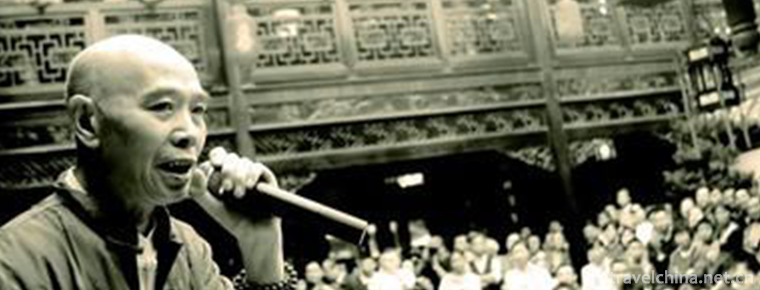
-
Cold Noodles with Sesame Sauce
Cold Noodles with Sesame Sauce are also called cold noodles.
Views: 133 Time 2018-10-12 -
The Museum of the Imperial Palace of Manchukuo
The Museum of the Imperial Palace of “Manchukuo†is located in Guangfubei Road, Kuancheng District, Changchun City. It is a Palace Ruins Museum built on the site of the Puppet Manchu Palac.
Views: 230 Time 2018-12-05 -
Flaming Mountains
Flame Mountain in Xinjiang is the most famous scenic spot in Turpan. Located in the northern margin of Turpan Basin, the northern route of the ancient Silk Road is mainly composed of red sand.
Views: 338 Time 2019-01-19 -
Liangshan Wushu
Liangshan is the hometown of the heroic stories of the Marsh, the place where the heroes of the Marsh flocked together and opposed oppression and exploitation in past dynasties. At the same time, it i.
Views: 90 Time 2019-05-13 -
Nanxian Flower Drum
On May 20, 2006, the local flower drum of Nanxian County was listed in the first batch of national intangible cultural heritage list with the approval of the State Council..
Views: 116 Time 2019-06-07 -
Puxian Ten Sounds and Eight Musics
Puxian Ten-tone Eight Music is not only the traditional folk art folk rap music in Putian area, but also the instrumental music. Ten tones, also known as ten times, are a comprehensive art of instrume.
Views: 152 Time 2019-06-09 -
Qinghai Lower String
Qinghai Xixian, which originated in the late Qing Dynasty, is one of the traditional folk arts native to Qinghai. It is a sitting and singing art, singing alone or in pairs..
Views: 245 Time 2019-06-11 -
Tujia Year
Tujia Year is an important and ancient festival of Tujia people in Xiangxi Tujia and Miao Autonomous Prefecture of Hunan Province. During the thousands of years of historical development, some relativ.
Views: 163 Time 2019-06-23 -
Xuan dance
Xuan is the Xiangxiong language. The earliest name used by Yongzhong Ben religion of the ancient Xiangxiong Buddha is "Xuan" dance. Xuan has more profound and profound implications. Xuan is .
Views: 127 Time 2019-07-09 -
Land resources in Suining
The total cultivated land area of Suining is 2.2815 million mu, of which the purple soil area is the largest, accounting for 62% of the cultivated land area, which is widely distributed in the low mountain and hilly areas..
Views: 337 Time 2020-12-16 -
Hydrology in Yibin
The water system in Yibin belongs to the external water system, with the Yangtze River as the main vein, with many rivers, high density and abundant water. Jinsha River and Minjiang River join to form the Yangtze River, which runs through the nor.
Views: 323 Time 2020-12-18 -
Dazhou culture
Baqu culture refers to the fact that Dazhou city is located in Bashan canal and belongs to Badi in ancient times. The chapter of Baqu customs is listed in the ancient book Taiping Huanyu Ji thousands of years ago; the second refers to the unique cultur.
Views: 364 Time 2020-12-20
